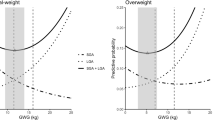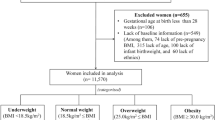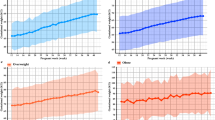Abstract
Background/objectives
The Institute of Medicine (IOM) recommends gestational weight gain (GWG) of 5–9 kg in women with a body mass index (BMI) ≥ 30 kg/m2. Debate continues as to whether GWG less than that recommended is safe in women with gestational diabetes mellitus (GDM). The study objective was to examine maternal and infant outcomes for obese women with GDM who lost weight or gained 0–5 kg during pregnancy.
Subjects/methods
A 7-year retrospective cohort study of pregnancy outcomes for obese women with GDM recorded in the Atlantic Diabetes in Pregnancy database was conducted. We examined pregnancy outcomes for mothers with GDM and a BMI ≥ 30 who either lost weight or gained 0–5 kg (Group 1, n = 237) and women who gained 5–9 kg (Group 2, n = 77). We further divided groups 1 and 2 into women treated by diet only (GDM-D) (n = 120) and those requiring additional treatment with insulin (GDM-I) (n = 194).
Results
GDM-D women in Group 1 were more likely to deliver earlier (38.9 vs 39.8 weeks, p < 0.01), to develop pregnancy induced hypertension (PIH) (15.4% v 0%; p = 0.02) or have a post-partum haemorrhage (PPH) (13.2% vs 0, p = 0.03) compared to women in Group 2. Rates of prematurity were higher in group 1 vs 2 (14.3% vs 0%, p = 0.03). However, further logistic regression analysis adjusted for smoking status, family history of diabetes, ethnicity and age determined no significant difference in maternal or infant outcomes for women in Group 1 compared to those in Group 2.
Conclusion
In our population, weight gain less than IOM guideline appears safe and is not associated with any further increase in adverse outcomes. However, validation through a prospective study with a larger obese GDM cohort is required before the findings presented here could be recommended for routine clinical use.
This is a preview of subscription content, access via your institution
Access options
Subscribe to this journal
Receive 12 print issues and online access
$259.00 per year
only $21.58 per issue
Buy this article
- Purchase on Springer Link
- Instant access to full article PDF
Prices may be subject to local taxes which are calculated during checkout
Similar content being viewed by others
References
Organization WH. Body Mass Index. http://www.euro.who.int/en/health-topics/disease-prevention/nutrition/a-healthy-lifestyle/body-mass-index-bmi.
Singh GK, DiBari JN. Marked disparities in pre-pregnancy obesity and overweight prevalence among US Women by Race/Ethnicity, Nativity/Immigrant Status, and Sociodemographic Characteristics, 2012–2014. J Obes. 2019;2019:2419263.
Hedley AA, Ogden CL, Johnson CL, Carroll MD, Curtin LR, Flegal KM. Prevalence of overweight and obesity among US children, adolescents, and adults, 1999–2002. JAMA. 2004;291:2847–50.
Hales CM, Fryar CD, Carroll MD, Freedman DS, Aoki Y, Ogden CL. Differences in obesity prevalence by demographic characteristics and urbanization level among adults in the United States, 2013–2016. JAMA. 2018;319:2419–29.
Sebire NJ, Jolly M, Harris JP, Wadsworth J, Joffe M, Beard RW, et al. Maternal obesity and pregnancy outcome: a study of 287,213 pregnancies in London. Int J Obes Relat Metab Disord. 2001;25:1175–82.
Berg C, Rosengren A, Aires N, Lappas G, Torén K, Thelle D, et al. Trends in overweight and obesity from 1985 to 2002 in Göteborg, West Sweden. Int J Obes (Lond). 2005;29:916–24.
Reynolds CME, Egan B, McMahon L, O’Malley EG, Sheehan SR, Turner MJ. Maternal obesity trends in a large Irish university hospital. Eur J Obstet Gynecol Reprod Biol. 2019;238:95–9.
Welfare AIOWA. A picture of overweight and obesity in Australia 2017. https://www.aihw.gov.au/getmedia/172fba28-785e-4a08-ab37-2da3bbae40b8/aihw-phe-216.pdf.aspx?inline=true.
He Y, Pan A, Yang Y, Wang Y, Xu J, Zhang Y, et al. Prevalence of underweight, overweight, and obesity among reproductive-age women and adolescent girls in rural China. Am J Public Health. 2016;106:2103–10.
Jelsma JG, van Poppel MN, Galjaard S, Desoye G, Corcoy R, Devlieger R, et al. DALI: Vitamin D and lifestyle intervention for gestational diabetes mellitus (GDM) prevention: an European multicentre, randomised trial - study protocol. BMC Pregnancy Childbirth. 2013;13:142.
Buckley BS, Harreiter J, Damm P, Corcoy R, Chico A, Simmons D, et al. Gestational diabetes mellitus in Europe: prevalence, current screening practice and barriers to screening. A review. Diabet Med. 2012;29:844–54.
Egan AM, Vellinga A, Harreiter J, Simmons D, Desoye G, Corcoy R, et al. Epidemiology of gestational diabetes mellitus according to IADPSG/WHO 2013 criteria among obese pregnant women in Europe. Diabetologia. 2017;60:1913–21.
Jensen DM, Damm P, Sørensen B, Mølsted-Pedersen L, Westergaard JG, Ovesen P, et al. Pregnancy outcome and prepregnancy body mass index in 2459 glucose-tolerant Danish women. Am J Obstet Gynecol. 2003;189:239–44.
Thornburg LL. Antepartum obstetrical complications associated with obesity. Semin Perinatol. 2011;35:317–23.
Stephansson O, Dickman PW, Johansson A, Cnattingius S. Maternal weight, pregnancy weight gain, and the risk of antepartum stillbirth. Am J Obstet Gynecol. 2001;184:463–9.
Hildén K, Hanson U, Persson M, Magnuson A, Simmons D, Fadl H. Gestational diabetes and adiposity are independent risk factors for perinatal outcomes: a population based cohort study in Sweden. Diabet Med. 2019;36:151–7.
Santos S, Voerman E, Amiano P, Barros H, Beilin LJ, Bergström A, et al. Impact of maternal body mass index and gestational weight gain on pregnancy complications: an individual participant data meta-analysis of European, North American, and Australian cohorts. BJOG. 2019;126:984–95.
Medicine. Io. National Academy of Sciences, subcommittee on nutritional status and weight gain during pregnancy. Washington, DC, USA: National Academy Press; 1990. pp. 1–233.
Chung JG, Taylor RS, Thompson JM, Anderson NH, Dekker GA, Kenny LC, et al. Gestational weight gain and adverse pregnancy outcomes in a nulliparous cohort. Eur J Obstet Gynecol Reprod Biol. 2013;167:149–53.
Crane JM, White J, Murphy P, Burrage L, Hutchens D. The effect of gestational weight gain by body mass index on maternal and neonatal outcomes. J Obstet Gynaecol Can. 2009;31:28–35.
Truong YN, Yee LM, Caughey AB, Cheng YW. Weight gain in pregnancy: does the Institute of Medicine have it right? Am J Obstet Gynecol. 2015;212:362.e1-8.
Voerman E, Santos S, Inskip H, Amiano P, Barros H, Charles MA, et al. Association of gestational weight gain with adverse maternal and infant outcomes. JAMA. 2019;321:1702–15.
Park JE, Park S, Daily JW, Kim SH. Low gestational weight gain improves infant and maternal pregnancy outcomes in overweight and obese Korean women with gestational diabetes mellitus. Gynecol Endocrinol. 2011;27:775–81.
Kalliala I, Markozannes G, Gunter MJ, Paraskevaidis E, Gabra H, Mitra A, et al. Obesity and gynaecological and obstetric conditions: umbrella review of the literature. BMJ. 2017;359:j4511.
Oken E, Kleinman KP, Belfort MB, Hammitt JK, Gillman MW. Associations of gestational weight gain with short- and longer-term maternal and child health outcomes. Am J Epidemiol. 2009;170:173–80.
McGowan JE. Neonatal hypoglycemia. Pediatrics in Review. 1999;20:e6–e15.
Barbosa ADM, Figueiredo Jr. I, de Lima GM. Neonatal Hypoglycemia. 2017 [cited 10th of November, 2020]. In: Selected Topics in Neonatal Care [Internet]. Intechopen. 2020. https://www.intechopen.com/books/selected-topics-in-neonatal-care/neonatal-hypoglycemia.
Komem D, Salman L, Krispin E, Arbib N, Bardin R, Wiznitzer A, et al. Gestational weight gain and weight loss among women with gestational diabetes mellitus. Diabetes Res Clin Pract. 2018;141:88–97.
Yee LM, Cheng YW, Inturrisi M, Caughey AB. Gestational weight loss and perinatal outcomes in overweight and obese women subsequent to diagnosis of gestational diabetes mellitus. Obesity (Silver Spring). 2013;21:E770–4.
Katon J, Reiber G, Williams MA, Yanez D, Miller E. Weight loss after diagnosis with gestational diabetes and birth weight among overweight and obese women. Matern Child Health J. 2013;17:374–83.
Bogaerts A, Ameye L, Martens E, Devlieger R. Weight loss in obese pregnant women and risk for adverse perinatal outcomes. Obstet Gynecol. 2015;125:566–75.
Cox Bauer CM, Bernhard KA, Greer DM, Merrill DC. Maternal and neonatal outcomes in obese women who lose weight during pregnancy. J Perinatol. 2016;36:278–83.
Blomberg M. Maternal and neonatal outcomes among obese women with weight gain below the new institute of medicine recommendations. Obstet Gynecol. 2011;117:1065–70.
Catalano PM, Mele L, Landon MB, Ramin SM, Reddy UM, Casey B, et al. Inadequate weight gain in overweight and obese pregnant women: what is the effect on fetal growth? Am J Obstet Gynecol. 2014;211:137.e1-7.
Kurtzhals LL, Nørgaard SK, Secher AL, Nichum VL, Ronneby H, Tabor A, et al. The impact of restricted gestational weight gain by dietary intervention on fetal growth in women with gestational diabetes mellitus. Diabetologia. 2018;61:2528–38.
Emond JA, Karagas MR, Baker ER, Gilbert-Diamond D. Better diet quality during pregnancy is associated with a reduced likelihood of an infant born small for gestational age: an analysis of the prospective new hampshire birth cohort study. J Nutr. 2018;148:22–30.
Knudsen VK, Orozova-Bekkevold IM, Mikkelsen TB, Wolff S, Olsen SF. Major dietary patterns in pregnancy and fetal growth. Eur J Clin Nutr. 2008;62:463–70.
Averett SL, Fletcher EK. Prepregnancy obesity and birth outcomes. Matern Child Health J. 2016;20:655–64.
Krstevska B, Velkoska Nakova V, Adamova G, Simeonova S, Dimitrovski C, Livrinova V, et al. Association between foetal growth and different maternal metabolic characteristics in women with gestational diabetes mellitus. Prilozi. 2009;30:103–14.
Shin D, Song WO. Prepregnancy body mass index is an independent risk factor for gestational hypertension, gestational diabetes, preterm labor, and small- and large-for-gestational-age infants. J Matern Fetal Neonatal Med. 2015;28:1679–86.
Author information
Authors and Affiliations
Contributions
DB, MM, AK, POS, and FPD designed the study. DB analysed the data and drafted the initial manuscript. All authors made substantial contributions to the acquisition and interpretation of data, revised the manuscript critically for important intellectual content and approved the final version to be published. DB is responsible for the integrity of the work as a whole.
Corresponding author
Ethics declarations
Conflict of interest
The authors declare that they have no conflict of interest.
Ethical approval
Ethical approval for this study was granted by the Clinical Research Ethics Committee, Galway University Hospitals. This study was conducted in accordance with the guidelines of the Declaration of Helsinki and Good Clinical Practice. Informed consent was obtained from all subjects.
Additional information
Publisher’s note Springer Nature remains neutral with regard to jurisdictional claims in published maps and institutional affiliations.
Rights and permissions
About this article
Cite this article
Bogdanet, D., Mustafa, M., Khattak, A. et al. Atlantic DIP: is weight gain less than that recommended by IOM safe in obese women with gestational diabetes mellitus?. Int J Obes 45, 1044–1051 (2021). https://doi.org/10.1038/s41366-021-00769-7
Received:
Revised:
Accepted:
Published:
Issue Date:
DOI: https://doi.org/10.1038/s41366-021-00769-7
This article is cited by
-
The exploration of optimal gestational weight gain after oral glucose tolerance test for Chinese women with gestational diabetes mellitus
Scientific Reports (2024)
-
Weight progression and adherence to weight gain target in women with vs. without gestational diabetes: a retrospective cohort study
BMC Pregnancy and Childbirth (2023)
-
Estimated optimal gestational weight gain for pregnant women with gestational diabetes mellitus: a prospective cohort study in China
European Journal of Clinical Nutrition (2023)
-
Sex-specific mediating effect of gestational weight gain between pre-pregnancy body mass index and gestational diabetes mellitus
Nutrition & Diabetes (2022)



